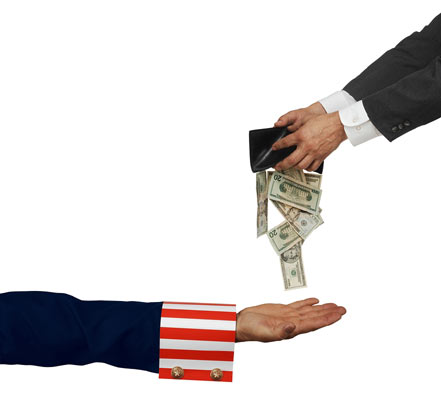
House Democrats, in a package of tax legislation that could be debated as soon as this week, will propose raising the corporate tax rate to 22% from 21% and lowering the estate tax exemption.
They say that would help offset the cost of expanding the earned income tax credit for low-wage workers, broaden tax credits for families with children and renew expired tax breaks for the bio-diesel and renewable energy industries.
The Republican-controlled Senate will reject anything that threatens to diminish their signature legislative achievement, but the House plan is a taste of what could come if the balance of power in Washington shifts after 2020.
Most Democrats are comfortable with a corporate tax rate of at least 28%, with some willing to go much higher.
Democrats almost universally agree the 37% tax rate on top earners should go back to what it was before the 2017 overhaul -- 39.6% -- and there's appetite for a much higher top rate on the wealthiest Americans. Some progressives have praised New York Representative Alexandria Ocasio-Cortez for her suggestion to raise the top tax rate to 70% for those earning millions.
The biggest threat to the overhaul isn't a second sweeping measure that wipes out the entire law, rather it is more likely to be rolled back bit-by-bit as Democrats see it as a way to pay for their agenda items, which have spanned from tax cuts to middle-earners to universal health coverage.
Democrats need to "tie tax changes to what we want to invest in rather than just saying we are going to take it away but not tell you what we are going to do instead," said Representative Pramila Jayapal, a Washington State Democrat and co-chairman of the House Progressive Caucus. "We have to have our own counter-proposal. It can be rolled out in smaller pieces."
House Ways and Means Committee Chairman Richard Neal, who is leading the House's effort to raise the corporate rate in the upcoming tax package, acknowledges it is just an opening bid for the negotiations for this year.
But 2020 Democratic presidential candidates see the 2017 tax law as the piggy bank for their proposals. Biden and former Texas Representative Beto O'Rourke have both released proposals to combat climate change that would be paid for by reversing the tax cuts. Harris has called to roll back the tax cuts for the wealthy to pay for direct tax credits for low-income and middle-earning workers.
"A corporate tax rate hike - of any size - should not be considered a viable option as lawmakers consider ways to fund new legislative proposals," said Katharine Cooksey, a spokeswoman for the RATE Coalition, a business group which supports the 21% rate. "When coupled with the threat of rising state corporate rates, any corporate rate increase at the federal level stands to drive taxes back up to a globally uncompetitive level, which in turn stunts U.S. job creation and wage increases."
Other economic headwinds, such as Trump's current and threatened tariffs on nearly all imports from China could further dim corporate optimism. Representative Andy Barr, a Kentucky Republican, supports extending the expired tax breaks in Neal's package but said he's worried that Democrats could roll back much of the economic stimulus in the tax cut bill.
"As trade uncertainty continues to swirl around there, it's really important we give businesses the long-term certainty to invest," Barr said.
Tariffs have already begun to cut into some of the gains from the tax cuts. The average household will face an $831 annual burden as a result of the tariffs on Chinese goods, according to a study from the Federal Reserve Bank of New York.
Concern about increasing the tax burden on middle-earners is also problematic for those Democrats who want to curtail the Trump tax cuts without exception. Several aspects of the law, such as an expanded child tax credit and a higher standard deduction that simplifies the filing process for many people, are popular with many voters.
Republicans say they hope that any tax increases by Democrats would become self-inflicted wounds in 2020. So far, about a year and a half since it was signed into law, only 32% of people view the overhaul favorably, according to an average of polls compiled by Real Clear Politics.
"What we have done is raise the economy and lifted people across the income spectrum," Representative Tom Rice, a South Carolina Republican, said. "Why they would want to go back on that is insane to me. Hopefully the American voters will see that in the next election."
Every weekday JewishWorldReview.com publishes what many in the media and Washington consider "must-reading". Sign up for the daily JWR update. It's free. Just click here.
(COMMENT, BELOW)
Previously:
• Wealth, estate taxes won't cover all 2020 Dem proposals. Levies that hit middle class could be on the progressives' menu
• Dems love a wealth tax, but maybe they should examine why Europeans are ditching the idea


 Contact The Editor
Contact The Editor
 Articles By This Author
Articles By This Author